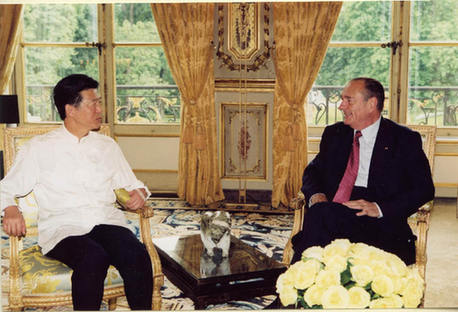|
From Political Diplomacy to Overall Diplomacy
Back in 1978 the Third Plenary Session of the 11th Central Committee of the Communist Party of China geared the country up for the era of reform and opening-up, with Deng Xiaoping instructing that diplomatic strategies and missions should serve China's economic advancement and modernization. Diplomacy was no longer simply a political concept; it would move from the political field to arenas that affected all walks of life.
In the past, international exchange rested on the shoulders of diplomats and government officials; only a few ordinary citizens were involved through non-governmental channels. In the three decades between 1949 and 1978, China saw only 280,000 outbound travelers, averaging about 10,000 a year. But today, 40 million Chinese visit abroad annually, and 56 million foreigners come to China. This depth and scope of international exchange has no precedent.
In the course of our development, economic diplomacy has really demonstrated its importance. Economic relations are the basis of international relations: the development of inter-state economic cooperation is what increases mutual interdependence and forms the bedrock for bilateral political, economic, cultural and other kinds of exchange and cooperation. The post-1989 period was the low tide of China's relations with the outside world, especially with developed countries. It was Western economic circles in particular that helped pull Sino-foreign relations out of their general ebb. The economists explained China's policies and lobbied their own government. This is an example of economic cooperation helping ameliorate political relations.
When I was ambassador to France, I spent 60 percent of my time handling economic issues. Diplomacy is not only an instrument for solving crises, but also a bridge via which you look for opportunities and seek cooperation. For example, during my term in France the Civil Aviation Administration of China came to buy equipment from a French company, who asked for US $130 million. After several days of negotiation, the French side refused to go lower than US $100 million. But breaking that price barrier was what was expected by the Chinese side. The Chinese negotiators came to our embassy for help. The next negotiation – a half hour in length – helped China save tens of millions of US dollars.
During my term in France, I was told that if a Chinese ambassador had spoken of economic issues 50 years ago, he would have been ridiculed, today he'd be an object of fun if he was a green horn economically. In retrospect, many good lessons were drawn from the effective application of economic diplomacy in the course of reform and opening-up. The most important of them, as I see it, is a win-win expectation, that is the drive to find and balance mutual interests on which the two sides can base cooperative efforts.
 |
|
June 2003: French President Chirac talks with Wu Jianmin after personally presenting him the Legion of Honor award. |
It's routine for Chinese ambassadors to submit a final report before they leave their post, and in my 2003 work report the phrase "Sino-French relations" never once appeared. Instead, I pounded away about my understanding of "diplomacy" and suggested that Chinese diplomatic means should be directed to the country's economic development.
The effect of cultural diplomacy can never be underestimated. It is like the spring showers that "nourish the world quietly" – as the ancient poem says. During my five years in France, in addition to performing my diplomatic missions, I gave more than 50 lectures annually. I also planned the 1999 Chinese Cultural Week, the 2000 Chinese Cultural Season and the 2003 Chinese Cultural Year.
One of my secretaries had completed an internship in Chirac's hometown of Correze while studying in France's National School of Administration. He recommended that I visit it, so I did, and was warmly received by the prefect of Correze. I stayed in the prefect's mansion, in an ancient-style guest room, which, he said, once hosted President Charles De Gaulle and his wife, and later President Jacques Chirac. The prefect suggested if President Jiang Zemin visited Correze during his 1999 trip to France, President Chirac would return the compliment and visit President Jiang's hometown of Yangzhou in 2000. I thought it was a good idea and passed the word back home. President Jiang accepted, and in October 1999, stayed in Correze, enjoying a private dinner at the Chiracs' home, Chateau de Bity. A year later, President Chirac came to Yangzhou. This was the first time in Chinese diplomatic history that a Chinese leader exchanged personal visits with a foreign counterpart.
|
